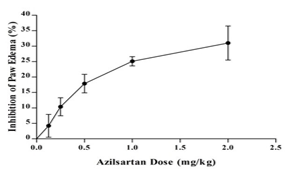Abstract
It is well documented that blockade of angiotensin II type 1 receptor may interfere with the progression of the inflammatory processes. The present study aims to evaluate the dose-response relationship of the anti-inflammatory activity of azilsartan in rat models of chronic and granulomatous inflammation. The study includes two parts: First part: 42 rats were allocated into 7 groups, each containing six rats, to evaluate the anti-inflammatory activity of different doses of azilsartan in the rat model of formalin induced chronic inflammation. Second part: 42 rats were allocated as in 1st group to evaluate the anti-inflammatory activity of azilsartan in the rat model of cotton pelletinduced granuloma. Azilsartan in a dose-dependent pattern (0.125, 0.25, 0.5, 1.0 and 2.0 mg/kg), significantly attenuated inflammation in both rat models utilized in the study with maximum effect achieved with 1.0 mg/kg, which is comparable to that reported for dexamethasone and relative linearity within the lowest dose range. In conclusion, azilsartan decreased formalin-induced chronic inflammation and cotton-pellet induced granuloma in rats in a dosedependent pattern. Therefore, it may be considered as a potential candidate for treating chronic inflammatory conditions in human.
Full text article
Authors

This work is licensed under a Creative Commons Attribution-NonCommercial-NoDerivatives 4.0 International License.

